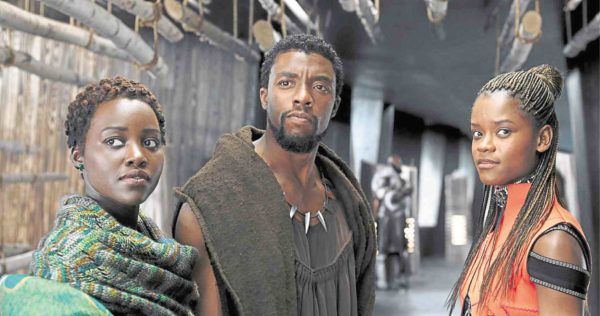On a cold Thursday evening, my friend and sometime colleague Victor Lirio treated me to a belated birthday dinner at one of our favorite sushi restaurants, Sushi Yasuda, and dessert at the Magnolia Bakery (another friend, PJ Pascual, joined us for cupcakes).
However, the one event of this night that we were looking forward to was a movie, and the film chosen for the night was “Black Panther.”
By now perhaps there won’t be such a thing as a spoiler as the movie has already raked in over a billion dollars in box-office receipts worldwide. It’s a phenomenon that had many black audience members dressing up in their finest African clothes just to see the movie. Quite a few of our “Once on This Island” company most certainly did so, and they were beautiful to see.
You really can’t blame the celebratory circumstances surrounding this movie. For one, this is the first time (at least in recent memory) that the hero, antihero, leading lady and most of the supporting characters are of African or African-American descent.
The Caucasian characters are not trying to actively save the day. The female characters, whether lead or support, are not damsels in distress waiting to be rescued (in fact, none of them does much waiting at all for anything), and the person in charge of all the out-of-this-world tech in the fictional country of Wakanda is a woman.
Wakanda, as portrayed in the film, is a peaceful and progressive country. Shielded and sheltered by an impenetrable rainforest, as well as a force field, no one outside of Wakanda has any idea just how advanced it is.
Thanks to its technology, gunshot wounds to the spine take a day to heal. One can fly
an aircraft or drive a car remotely. And the suit of the Black Panther himself is hidden in plain sight, and does not require a trip into a phone booth or
a cave for the transformation
to happen.
Wakanda also boasts the most beautiful sunsets in the world, as well as mountains
and waterfalls, its natural resources contributing greatly to its prosperity.
However impressive all of this looks onscreen, along with the special effects that a Disney property boasts of, for me it’s ultimately the performances of the actors that truly make a movie like this work.
There are no two-dimensional performances from anyone. All the characters are fully realized and human, regardless of who they are.
Chadwick Boseman as King T’Challa is what one would expect from a Marvel superhero: lean and muscular, strong and wise, his eyes conveying intelligence, as well as a healthy sense of humor, with his heart firmly focused on the good of his country and his people.
But his king is not an invulnerable human, which makes this audience member totally in his corner.
Michael B. Jordan makes for a compelling antihero. As Erik Killmonger, trained in the military and ruthless in his ambition, he has the unenviable task of humanizing the bad guy, which he does with success.
Oscar winner Lupita Nyong’o is fierce as Nakia, T’Challa’s girlfriend, who has a calling to aid in social justice, and would not be satisfied to be a mere extension of the king.
Okoye, portrayed by Danai Gurira, is the head of the elite guard that protects the king called the Dora Milaje, a band of bald women warriors whose loyalty is to the throne, which can be a good or bad thing.
She is fearless, unflinching and unapologetic, placing herself as the protector of her country first. No one dares to mess with her.
And as the king’s younger sister Shuri, who’s also the creator of the technological advancements of her country, Letitia Wright is smart and sassy, a great foil for the more serious T’Challa.
Also excellent in their roles are Daniel Kaluuya (W’Kabi), Martin Freeman (Everett K. Ross), Winston Duke (M’Baku … just watch the scene in his throne room), Sterling K. Brown (N’Jobu), Angela Bassett (Queen Mother Ramonda), Forest Whitaker (Zuri) and Andy Serkis (Ulysses Klaue).
This is quite possibly the best Marvel movie I’ve seen. Perhaps I’m seeing far more in it than I have in past Marvel films, but this is the first blockbuster superhero film where the title character is black.
The white guy, though does aid in saving the day, isn’t the primary savior, and the women have as much strength as the men (if not more) in advancing the plot and story.
The fight scenes have men and women pitted against each other, and at no time at all did I ever feel the fights were unfairly matched. Here, it’s the black girl who tells the white guy what to do. I love the absence of “mansplaining” in this movie.
Watching this film filled my heart with so much inspiration. As a woman of color, I am filled with the hope that more heroes of different skin colors will be able to take the lead in movies that actually reflect the reality of how diverse this world is.
To have representation—seeing that you resemble the hero of the film you’re watching—is incredibly important, and the times seem to be moving in that direction.
I shall definitely see “Black Panther” again, this time with my daughter in tow. Here’s hoping it inspires her as much as it has inspired me.


